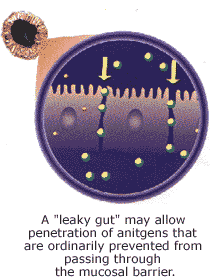Food and Environmental Allergies
What is an allergy?
The word "allerg" is derived from the greek words meaning "altered reaction". An allergic reaction occures when the immune system "overreacts" to a substance by identifying it as an invading organism, provoking a chain of defensive physical reactions in the body.
What are the Symptoms?
You may be familliar with some of the more common allergy symptoms, such as asthma, sneezing, and skin rashes. But you may not know that allergies can affect every major system and organ in the body, causing recurrent infections, body pains, fatigue, anxiety, depression, and a host of other symptoms.
Are Symptoms Always Immediate?

Although many allergic reactions occur soon or immediatley after exposure to the offending substance, researchers are finding that, more and more, reactions are often delayed-and may occur for hours or even days after exposure. One study reported that nearly 60% of patients with food intolerance experienced delayed, rather than immediate, reactions to provoking foods.
What Causes Allergies?
The substance which provokes an allergic reaction is called an allergic or antigen.This can be a substance that is ingested, such as milk, corn, fish, or other foods. Allergens can also be substances in the surrounding environment, such as house dust, animal dander, chemicals, bacteria and pollens, which induce allergic reactions after being touched or inhaled.
Why is it Important to Identify Allergens?
People who choose to treat their allergy symptoms using antihistamines and other drugs may not realize that chronic use of those drugs can dampen the immune system, placing them at increased risk of developing infections and malignant tumors. What's more, these drugs often have unpleasant side effects, including drowsiness, hypertension, weight gain, and even diabetes. That's why it's important to be tested, so your physician can directly treat the causes of your allergic reactions, instead of the symptoms.
Even if you only suffer from low-grade symptoms (of which you may not be aware), it is important to identify all of your body's know allergens. Allergic responses, following periods of infection or stress, can create more severe and more varied symptoms. Over time, allergies place cumulative stress on the body's immune system, which can result in more serious conditions such as migraines, arthritis, gastrointestinal disorders, and autoimmune diseases.
Why are Allergies Increasing?
No one knows for sure why allergies are on the rise. Some scientist believe that increased chemical pollution in our air, water, and food is causing an esculation in the frequency and severity of allergic reactions. And most commercial foods now contain hundreds of hidden ingredients - both natural and sythetic - that have been identified as agents in many allergic reactions. Genetic manipulation of plants, less diversity in the average diet, and poor digestive function have also been suggested as contributing factors.
How Common are Allergies? Allergies have been around for a long time. A case of food allergy was recorded over 2000 years ago by the ancient greek physician Hippocrates, who observed that milk could cause gastric upset and hives. In modern times, food and environmental allergies have increased dramatically. It has been estimated that at least 60% of the American population suffers from symptoms associated with food reactions. some physicians even claim that food allergies are now the leading cause of most undiagnosed symptoms.
